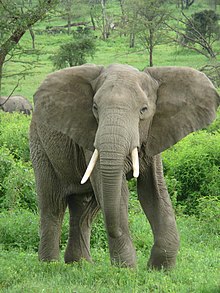elephas
Jump to navigation
Jump to search
See also: Elephas
Latin[edit]

Alternative forms[edit]
Etymology[edit]
From Ancient Greek ἐλέφᾱς (eléphās), from Mycenaean Greek 𐀁𐀩𐀞 (e-re-pa) from a compound of Berber *eḷu and either Egyptian ꜣbw,
| |
Pronunciation[edit]
- (Classical) IPA(key): /ˈe.le.pʰaːs/, [ˈɛɫ̪ɛpʰäːs̠]
- (modern Italianate Ecclesiastical) IPA(key): /ˈe.le.fas/, [ˈɛːlefäs]
Noun[edit]
elephās m (genitive elephantis); third declension
Declension[edit]
Third-declension noun.
| Case | Singular | Plural |
|---|---|---|
| Nominative | elephās | elephantēs |
| Genitive | elephantis | elephantum |
| Dative | elephantī | elephantibus |
| Accusative | elephantem | elephantēs |
| Ablative | elephante | elephantibus |
| Vocative | elephās | elephantēs |
Synonyms[edit]
- (elephant): barrus, elephāns
- (elephantiasis): elephantiasis, elephantia, elephanticus morbus
Descendants[edit]
Descendants derived from elephās, elephantus and elephāns all listed here.
- Corsican: elefante
- Italian: elefante
- → Sicilian: lifanti (or inherited from Latin)
- Ladin: elefant
- Ligurian: liofante
- Lombard: elefant
- Navarro-Aragonese:
- Neapolitan: liufante, alifante
- Old Leonese:
- Old Occitan: elephant
- Old Galician-Portuguese: helefante, elefante, elifante
- Rhaeto-Romance:
- Piedmontese: elefant
- Sardinian: elefante, elefanti
- Sicilian: lifanti (or via Italian)
- Vulgar Latin: *olifantus
- Old French: olifan, elefant, olifant, oliphant
- → Gothic: 𐌿𐌻𐌱𐌰𐌽𐌳𐌿𐍃 (ulbandus) (uncertain; one of several theories)
- → Proto-Slavic: *velьb(l)ǫdъ (see there for further descendants)
- → Albanian: elefant
- → Proto-Germanic: *ulbanduz (“camel”) (see there for further descendants)
- → Proto-West Germanic: *elpand (“elephant; ivory”) (see there for further descendants)
- → Middle French: elephant
- → Chukchi: эʼԓыпын (ėʼḷypyn)
- → Danish: elefant
- → Estonian: elevant
- → Finnish: elefantti
- → Hungarian: elefánt
- → Malagasy: elefanta
- → Mezquital Otomi: elefante
- → Mukulu: 'elbi ?
- → Northern Sami: elefánta
- → Norwegian: elefant
- → Samoan: 'elefane
- → Scottish Gaelic: ailbhean
- → Upper Sorbian: elefant
- → Swedish: elefant
- → Tagalog: elepante
- → Võro: elevant'
- → West Frisian: oaljefant
- → Latvian: elefants
- → Faroese: elefantur
- → Low German: Elefant
- → Chamorro: elifante
- → Inuktitut: alipa
- → Limburgish: Olifante
- → Tuvaluan: elefane
- → Quechua: eliphanti
- → Latgalian: elefants
- → Silesian: elefant
See also[edit]
References[edit]
- elephas in Charles du Fresne du Cange’s Glossarium Mediæ et Infimæ Latinitatis (augmented edition with additions by D. P. Carpenterius, Adelungius and others, edited by Léopold Favre, 1883–1887)
- “elephas”, in Harry Thurston Peck, editor (1898), Harper's Dictionary of Classical Antiquities, New York: Harper & Brothers
- “elephas”, in William Smith, editor (1854, 1857), A Dictionary of Greek and Roman Geography, volume 1 & 2, London: Walton and Maberly
- “elephas”, in William Smith et al., editor (1890), A Dictionary of Greek and Roman Antiquities, London: William Wayte. G. E. Marindin
Categories:
- Latin terms derived from Ancient Greek
- Latin terms derived from Mycenaean Greek
- Latin terms derived from Berber languages
- Latin terms derived from Egyptian
- Latin terms derived from Sanskrit
- Latin 3-syllable words
- Latin terms with IPA pronunciation
- Latin lemmas
- Latin nouns
- Latin third declension nouns
- Latin masculine nouns in the third declension
- Latin masculine nouns
- la:Elephants